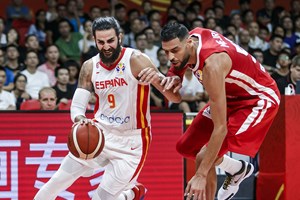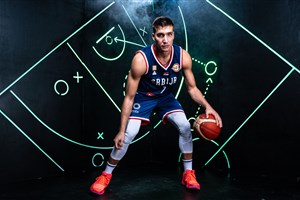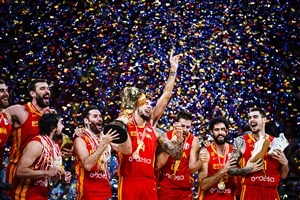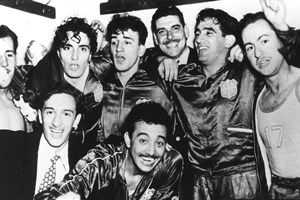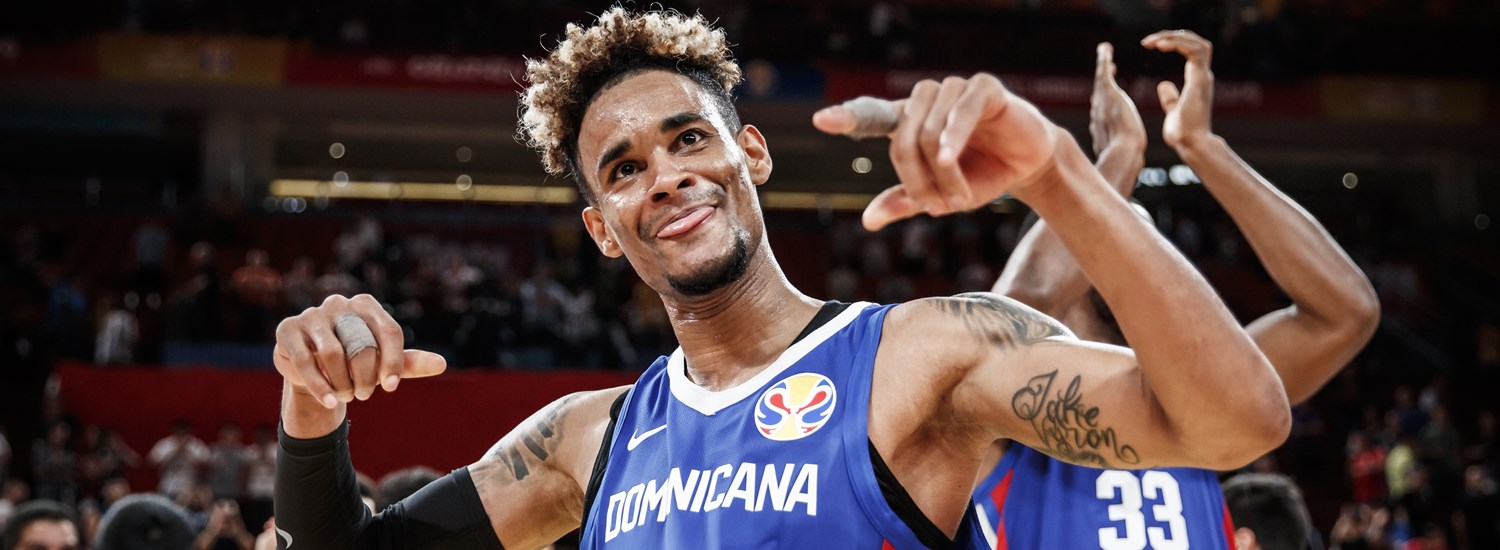
Latin Americans ride wave of emotion, belief into Second Round
SHENZHEN (China) - The FIBA Basketball World Cup 2019 Second Round will have a significantly Latin American flair to it as five teams from central or southern America are among the last 16 teams standing, thanks in large part to riding a wave of emotions and belief over their opponents.
Argentina, Brazil, Dominican Republic, Puerto Rico and Venezuela all advanced through their First Round groups - Argentina and Brazil as undefeated group winners and not much of a surprise while the other three were more expected to be playing in the Classification Round than being still alive for the Quarter-Finals.
While Puerto Rico faced a challenge with Spain, Iran and Tunisia in Group C and Venezuela had hosts China, Poland and Cote d'Ivoire in Group A, the Dominicans may have been the biggest surprise, given the fact that they had two European powers in Group G in Shenzhen with France and Germany - both with multiple NBA players. But Dominican Republic surprised Germany for a spot in the Second Round alongside France to take on Australia and Lithuania in Nanjing.
"SOMETIMES PEOPLE DON'T KNOW ABOUT IT BUT THERE ARE SOME GOOD PLAYERS ON OUR CONTINENT."
"Believe; we had to believe. Especially the 20 guys we got inside here working. For this to become a reality, we had to believe," said Dominican big man Eulis Baez, who is one of four players on the team who played at the last World Cup in Spain.
"Anything else is not important to us. It has to be that way today, tomorrow and everyday forever in the national team."
Pushing belief in yourself is one of the keys to Dominican head coach Nestor 'Che' Garcia as well.
"For the players, their world has changed. Before it was: if you see, you believe. Now, it's if you believe it, you will see it. That is my message for my players," Garcia said.
It wouldn't be a surprise if the 54-year-old Argentine coach now in charge of the Dominicans shed a tear of joy - or at least gave a hearty fist-pump - after Venezuela knocked off hosts China to also reach the Second Round, the first time in the country's history that they advanced from the First Round of a World Cup.
Garcia, after all, guided the Venezuelans to one of their biggest achievements four years ago as they upset a Canadian team stocked with NBA players in Semi-Finals of the FIBA AmeriCup 2015 to book their first ticket to the Olympics in 24 years and then beating Argentina for their first ever AmeriCup title.
"Those are my people. They are like my little brothers and I am very happy," Garcia said about the Venezuelan team, which he coached from 2013 to 2017. "They work hard. They have grown up so much. They have knowledge about the game, they have basketball IQ, they know how to win. They are learning a lot and now they are playing good basketball."
Garcia was very excited to see Latin America so well represented in the Second Round.
"It's very good for Latin America because we play good basketball on our continent. Sometimes people don't know about it but there are some good players in Latin America. This is a big success, having all the teams in the Second Round," he said.
After Garcia left, another Argentine took over in Fernando Duro, who was an assistant coach for the Argentina team that won the 2002 World Cup and appeared at the 1996 and 2004 Olympics and was an assistant for Brazil at the 2010 World Cup and 2012 Olympics. Duro retained the team identity at Venezuela and the added experience just helped the program get even better.
"IT'S VERY GOOD FOR LATIN AMERICA BECAUSE WE PLAY GOOD BASKETBALL ON OUR CONTINENT." - Nestor 'Che' Garcia
"Since 2012, we changed the way we play. We focus more on playing as a team. Winning as a collective rather than relying on one scoring option. We changed the mentality and keep going in this direction," said 37-year-old Jose Vargas, who won the AmeriCup 2015 title with Garcias.
One way to tell a team's heart and hustle is offensive rebounds and Venezuela are far and away tops in that category in China with 17.7 offensive rebounds per game - 3.0 more per game than the next best team. Not surprisingly, Argentina (fourth), Puerto Rico and Dominican Republic (both tied for sixth) are also top 7 in offensive rebounds, which are a good measure of a team’s energy.
"These guys compete. They are warriors. We had a lot of negativity before the tournament. Everybody discarded us. These guys got together as a family. This is an incredible group. They came out and competed and I tip my hat how they came back and won the game (vs Tunisia)," Puerto Rico head coach Eddie Casiano said. "They represent the country the best I've seen in 18 years in the national team. It's an honor to be the coach of the group. I am very proud to be in front of these guys. We have a group that plays together."
"(LATIN AMERICAN TEAMS) GIVE EVERYTHING THEY HAVE IN THE TANK." - Brazil guard Marcelinhos Huertas
The victory gave Puerto Rico a 2-1 record in Group C and a spot in the top 16 for the first time since 2002, when they finished seventh. That 2002 World Cup in Indianapolis actually saw three Latin America teams finish in the top eight - finalists Argentina, seventh placed Puerto Rico and eighth-placed Brazil.
Four years later, Argentina taking fourth place was the only Latin American team in the top 16 and Argentina finishing fifth and Brazil ninth were the only teams from the region in the last 16 in 2010. Five years ago, though, there were also four Latin American teams in the top 16: Brazil 6th, Argentina 11th, Dominican Republic 13th and Mexico 14th.
"Nowadays basketball has evolved a lot across the world. Basketball in the Americas is played relatively different. Teams from that part of the globe might not be as physical as other teams, but they give everything they have in the tank. It’s not a surprise to see so many of these teams moving on in this World Cup," said Marcelinho Huertas, who is playing in his fourth World Cup.
"I know those (Latin American) teams well because we played some of them in the (Americas) Qualifiers, and we know how difficult it is to play them. You can find quick players, good shooters in almost every team there," added Brazil’s head coach Aco Petrovic, who also coached the national teams of his native Croatia and Bosnia and Herzegovina.
 Gian Clavell played all 12 games in the Americas Qualifiers for Puerto Rico
Gian Clavell played all 12 games in the Americas Qualifiers for Puerto Rico
Another distinct characteristic of the Latin American teams in China is a commitment to the national team. Dominican Republic and Venezuela both have 12 players who played in the Americas Qualifiers with eight Dominicans appearing in at least eight games and seven Venezuelans representing them at least eight times. Argentina have 11 players from the Americas Qualifiers, Brazil 10 and Puerto Rico eight.
And the teams are also very, very experienced. While Argentina are actually relatively young with seven players under 28 years of age - but with the 39-year-old Luis Scola, the other four sides have plenty of players who are on the other side of the 30-years mark. Brazil have five players 35 years or older while eight Venezuelans are 30-plus, seven Dominicans and five Puerto Ricans.
Argentina head coach Sergio Hernandez is excited to see what the quintet can do in the Second Round, where his team plays in Group I along with Venezuela, Poland and Russia in Foshan, while Puerto Rico are in Group J in Wuhan with Italy, Serbia and Spain; Brazil play in Group K in Shenzhen with Czech Republic, Greece and United States; and Dominican Republic head to Nanjing for Group L with Australia, France and Lithuania.
 Passion is part of Luis Scola's game - and that of Latin American teams
Passion is part of Luis Scola's game - and that of Latin American teams
"It's a good chance for us to show the rest of the world that we can play basketball. It's my third World Cup, I have three Olympic Games (appearances), and we played a lot of times against European, Asian, African teams and the United States team. Sometimes, people don't really know about South American basketball. And South American basketball is great basketball, a lot of players from Argentina or Brazil played in Europe, and this is a good opportunity for us, for the South American teams to show the rest of the world our basketball. To find respect," Hernandez said.
Finding respect may be one thing, but Hernandez promptly switched to some national pride - and a decent sense of humor - when he added: "But now, I want them to lose, and we keep winning to go to the Olympic Games. I'm happy. But that's it, it's over."
Oh, that's right, those waves of emotion and belief come also because of these countries' strong national pride - something which has carried five Latin American teams to the Second Round.
FIBA








